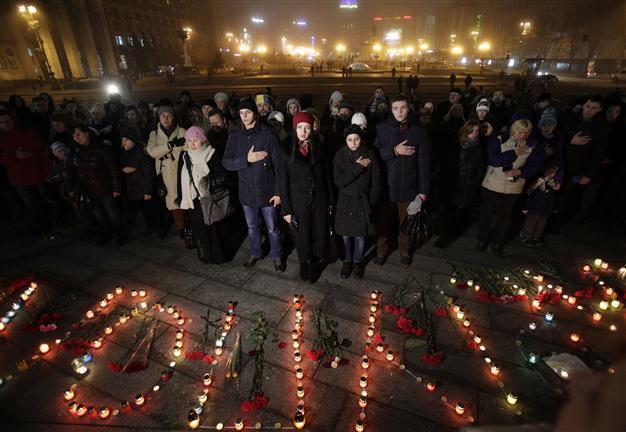Ukraine scrambles after new rebel attacks
MARIUPOL, Ukraine - Agence France-Presse

People sing the Ukrainian national anthem next to candles set to form the name "Mariupol" on Independence Square in Kiev on January 24, 2015 in memory of people who died during shelling in the southern Ukrainian city of Mariupol. AFP Photo
Ukraine's President Petro Poroshenko was chairing an emergency security meeting Sunday to forge a response to a new offensive by pro-Russian rebels after rocket strikes on a vital government-held port killed 30 people.
Regional police said 95 people were also wounded by dozens of long-distance rockets that smashed into a packed residential district and a market in Mariupol on Saturday.
The attack heightened global pressure on Russia to rein in the insurgents and halt a nine-month conflict that has already killed 5,000 people in the former Soviet state.
Russian President Vladimir "Putin is directly responsible for the death, blood and suffering of Ukrainians," National Security and Defence Council chief Oleksandr Turchynov told an emergency meeting Saturday.
Ukraine observed a day of mourning for the victims, lowering flags in government-controlled parts of the country and halting subway trains for a minute at noon in major cities such as Kiev.
"It is really dangerous here now," Mariupol resident Yulia Simina told AFP.
The 27-year-old said she had moved to the city to avoid the daily bloodshed in the rebel stronghold of Donetsk that lies to the north.
But she lost her car in the shelling and just avoided being hit by shrapnel herself.
The self-proclaimed Donetsk People's Republic's leader Alexander Zakharchenko claimed Saturday that "today, we launched an offensive against Mariupol".
He later denied ordering an actual invasion of the industrial port of half a million people, and his deputy rejected responsibility for the civilian deaths.
But the Organisation for Security and Cooperation in Europe (OSCE) said the Grad and Uragan rocket fire came from two locations "controlled by the 'Donetsk People's Republic'".
The attack on the last Kiev-controlled major city in the restive east was condemned by Western leaders who blame Moscow for stoking the conflict that has claimed more than 5,000 lives.
US Vice President Joe Biden warned that costs would "continue to rise" on Russia over its intervention in Ukraine and military support for the revolt -- a charge Moscow flatly denies.
EU foreign policy chief Federica Mogherini said the latest escalation "would inevitably lead to a further grave deterioration of relations between the EU and Russia".
Putin on Friday accused Kiev's leaders of launching "large-scale combat operations" in the east in violation of a tattered September truce.
But the Kremlin and Russia's foreign ministry remained conspicuously silent about Saturday's attack.
"Why is Moscow silent on the crime committed by terrorists in Mariupol?" Ukrainian Foreign Minister Pavlo Klimkin said on Twitter.
The sprawling port remained calm overnight and early Sunday as international monitors patrolled its muddied streets.
Rebel leader Zakharchenko gave a mixed message in the wake of the bloodshed, calling the potential capture of Mariupol "the best tribute possible for all our dead" but adding that his troops were "saving their strength" and not conducting any "active" operations in the port.
Western leaders watched warily as violence once again threatened to spiral out of control in what is already one of Europe's deadliest and most diplomatically-explosive crises since the Cold War.
Washington and Brussels have imposed sanctions on Russia for its March seizure of Crimea and backing of the separatists.
US Secretary of State John Kerry called on Russia to "end its support for separatists immediately, close the international border with Ukraine and withdraw all weapons, fighters and financial backing".
NATO Secretary General Jens Stoltenberg also urged Russia to "stop destabilising Ukraine".
Mariupol provides a land bridge between guerrilla-held regions in the east and the Black Sea peninsula of Crimea.
It is also the gateway for most of the southeast's vital coal and steel exports as well as home to two of Ukraine's largest smelters.
A rebel assault on the port in early September saw Kiev repel the attack at such heavy cost that it prompted Poroshenko to pursue peace and offer the rebels three years of limited self-rule.
But the ceasefire was followed by further clashes that killed at least 1,500 people, and combat resumed in full in mid-January after a three-week lull.
Western diplomats linked the rebel advance to a new infusion of Russian troops -- denied by the Kremlin -- designed to expand separatist holdings before the signing of a final truce and land demarcation agreement.
Ukraine claimed Monday that Moscow had poured nearly 1,000 more Russian soldiers and dozens of tanks into the southeast to secure control over factories and coal mines that could help the rebels build their own state.
"Taking Mariupol is a first step to a broader offensive. It is also an end in itself, anchoring the southern flank in the city," the US-based Stratfor global intelligence company warned in a "red alert" issued to clients.
